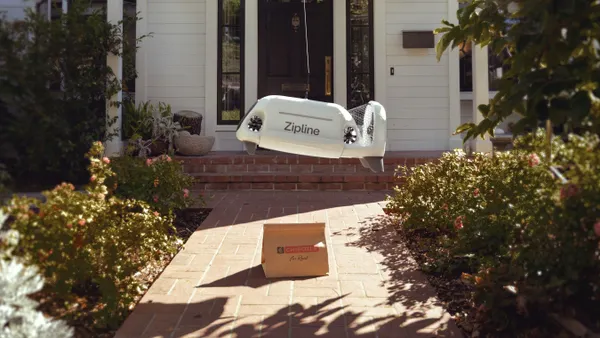Dive Brief:
- Illinois and DoorDash have reached a $11.3 million settlement that would, pending court approval, resolve a suit alleging DoorDash failed to pay full tips to as many as 79,000 workers in the state between 2017 and 2019, court records show.
- Illinois accused the company of misleading consumers who believed the entirety of their tips would go directly to workers, according to a press release from the office of Attorney General Kwame Raoul.
- While DoorDash discontinued the practice at issue in the suit in 2019, gig worker pay and classification as well as delivery firms’ communications with consumers remain under regulatory scrutiny in many jurisdictions. DoorDash agreed to a similar settlement over the same pay policy in Washington, D.C., in 2020.
Dive Insight:
Illinois alleged that DoorDash gave consumers reason to believe that 100% of tips would go to delivery workers. At the time, however, DoorDash counted those tips towards guaranteed pay for workers, and tips that exceeded the guaranteed pay amount were retained by the company, according to the suit.
The settlement does not constitute an admission of liability or wrongdoing by DoorDash, and the company agreed to it as an expedient to resolve litigation, court records say.
Eligible workers who file a claim as part of the settlement will receive a payment of at least $2 plus a proportionate share of the roughly $11 million settlement fund.
In a statement emailed to Restaurant Dive, a DoorDash spokesperson emphasized that the suit targeted DoorDash’s pay model in use in the state from 2017 to 2019.
“Dashers always keep 100% of tips from orders on the DoorDash app,” the spokesperson wrote. “We are pleased to have resolved this years-old matter.”
The settlement requires DoorDash not to use tips when calculating the company’s contribution to worker base pay, and to clearly disclose how it calculates pay to workers and to consumers, Raoul’s office said.
This year has been a busy one for delivery regulation. Delivery providers are engaged in a long running political battle over driver pay in Seattle. In New York City increased base pay was partly offset by decreases in consumer tipping and moves by apps to restrict the supply of labor.
In September a judge took Uber Eats and DoorDash’s side in a New York court case, preventing the firms from having to share some consumer data with restaurants in New York. In Florida, the delivery industry secured an important legislative victory when Gov. Ron DeSantis approved a bill designed as a compromise between the delivery aggregators and the hospitality lobby that preempts local regulations on app-based delivery.














